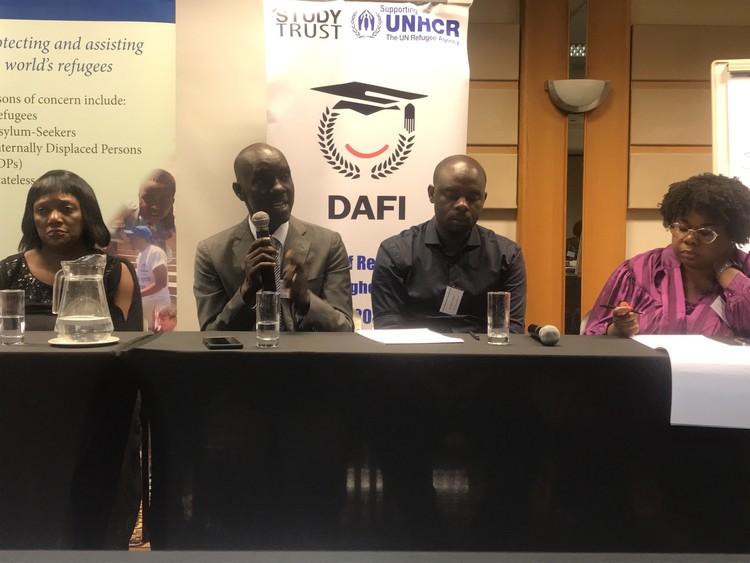“You won’t be making mistakes if you invest in immigrants”
Scalabrini Centre event highlights need for university scholarships for foreign nationals
Panelists at the event (Left to Right) were Ellen Boriwondo of Scalabrini Centre, Pulmonologist Dr Emmanuel Taban, Jamala Safari of HCI Foundation and Aureli Kalenga of EyeWitness News. Photo: Tariro Washinyira
- The Scalabrini Centre and its partners hosted an event on Monday to highlight the need for tertiary funding opportunities for refugees and immigrants excluded from government bursary and scholarship opportunities.
- During the event, several former refugees spoke about how getting bursaries changed their lives. Most of them could not get government funding and had to rely on relatives or private funding.
- Dr Emmanuel Taban, a leading pulmonologist, who is also a former refugee from war-torn South Sudan, gave the keynote address.
“The fact that immigrants have the [guts] to leave their country and go through hardship to come to South Africa, means they have proved their resilience,” says Dr Emmanuel Taban, a leading pulmonologist who is also a former refugee from war-torn South Sudan.
Dr Taban gave the keynote address at an event in Cape Town on Monday aimed at garnering more support and funding for refugees and immigrants who are excluded from government bursary and scholarship opportunities.
The event was organised by the Scalabrini Centre and its partners which include the Islamic Relief, Hosken Consolidated Investments (HCI) Foundation, DAFI Scholarship, Study Trust, UNHCR and the International Organization for Migration (IOM).
In 2021 Dr Taban won a ‘African person of the year’ award and authored his autobiography titled The boy who never gave up, which describes his journey from being abducted by troops and forced to flee to South Africa at just 16. Taban said his first few years in South Africa were far from easy. He said he collapsed three times at school due to extreme hunger.
He described going to Home Affairs’ offices at 3am and only returning after 5pm. “You won’t be making mistakes if you invest in immigrants. I’m a perfect example of how a refugee — who came with absolutely nothing — is today a world leader. If immigrants and refugees are given a chance, they will uplift the society and make a difference.”
Taban said as an UNHCR alum, he hopes to spread the word and garner support for more funding. “It is never easy to be a refugee but never ever give up. One day things will open up,” he said.
James Chapman Head of Advocacy and Legal Advisor at Scalabrini said that by highlighting Dr Taban’s story, they hope it will show the meaningful and positive impact of giving refugees access to public tertiary funding opportunities.
“We engaged a lot of businesses, companies and foundations who offer funding. They offer about R14-million towards tertiary funding compared to billions of rands offered by the National Student Financial Aid Scheme (NSFAS) and other private funders. We should do it collectively and fund not only South Africans. The international immigrant population in South Africa is approximately 2.9 million and many are unable to do tertiary education because of lack of funds or they are not permitted,” he said.
During the event, several former refugees spoke about how getting bursaries changed their lives. Most of them could not get government funding and had to rely on relatives or private funding.
Ellen Boriwondo of Scalabrini said she was attending school back home in Zimbabwe until 2002 when her father, an opposition politician at the time, was forced to flee the country.
They moved to Cape Town, leaving behind most of their large belongings and family businesses. To make ends meet, she went door-to-door selling goods with her sister.
“Later I was accepted at the University of Cape Town despite having no fees. I could not raise the amount for my studies twice until my aunt came to my rescue. Now I have masters degrees in Social Sciences and Human Rights Law,” she said.
Jamala Safari, a former refugee of the DRC, said that because he struggled to get support when he arrived in South Africa, he was forced to work as a car guard and other piece work to fund his studies at the University of the Western Cape.
Next: Small Eastern Cape municipality spends more than R1-million on a meeting in a Durban hotel
Previous: Lottery whistleblowers: Right the wrongs done to us
© 2023 GroundUp. This article is licensed under a Creative Commons Attribution-NoDerivatives 4.0 International License.
You may republish this article, so long as you credit the authors and GroundUp, and do not change the text. Please include a link back to the original article.
We put an invisible pixel in the article so that we can count traffic to republishers. All analytics tools are solely on our servers. We do not give our logs to any third party. Logs are deleted after two weeks. We do not use any IP address identifying information except to count regional traffic. We are solely interested in counting hits, not tracking users. If you republish, please do not delete the invisible pixel.



